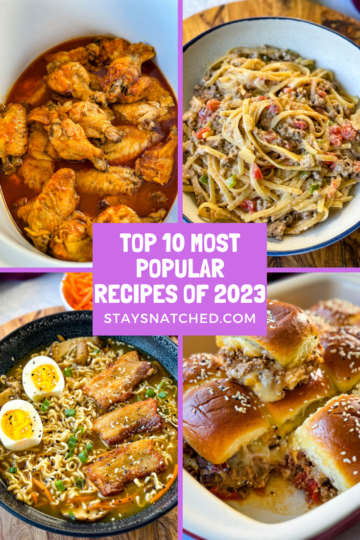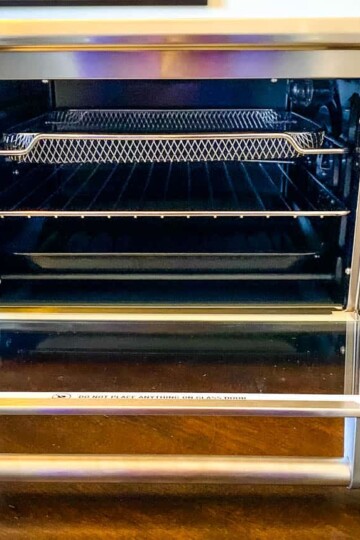SPOILER ALERT: This post contains specific references and commentary from the film.
A couple of weeks ago I spent an early Friday evening watching the What The Health documentary on Netflix. You are probably raising your eyebrow and wondering, a documentary on a Friday night?! In my defense, it was practically late afternoon! I left work early that day because I had to work a ton of late nights throughout the week. I ran a couple of errands and settled in with the documentary.
Unlike most people, I had not heard a ton of buzz about this documentary prior to watching it. In fact, I had only heard it mentioned once on social media. I figured it would be like Super Size Me or any of the other large food-based documentaries that are out there. It was definitely like those others, but a lot more pointed in my opinion.
Table of Contents
Opening Remarks
The documentary starts with a quote: “Let food be thy medicine and medicine be thy food.” ~Hippocrates
This quote starts the onset of the argument that food should be used as medicine to cure disease.
It then leads into an interview with a representative of the American Diabetes Association. He cites diabetes as an epidemic with 350 million people living with the disease. He further states 1 in 3 Medicare dollars and 1 in 10 total health care dollars is spent on diabetes. From there, the host asks, “What in particular is the correlation between diet and diabetes?” The representative refuses to answer the question. The interview ends and it appears as though the American Diabetes Association is choosing to be uncooperative.
We see this interview later and can tell this opening was clearly edited to fit the film maker’s narrative.
Next, the narrator, Kip, introduces himself as a filmmaker and hypochondriac who comes from a family with diabetes, heart disease, and cancer. He says he has a history of using WebMD symptom checkers often. Kip grew up thinking he was eating a healthy diet. He became curious about the food he was eating when it was reported that bacon, sausage, and processed meat cause cancer due to carcinogens.
Kip cites a study that says one serving of deli/processed meat (a 50-gram portion) increases the risk of colorectal cancer by 18%. Further, he introduces the World Health Organization’s classification of processed meat as a Group 1 Carcinogen. He remarks, “Group 1 Carcinogens are in the same group as tobacco and asbestos. Have I been smoking my entire childhood?”
Ok, let’s dissect this intro. A LOT of information and statistics were introduced very EARLY into this film. The surplus of stats never really dies off throughout the film. I felt like I was constantly being hit with shock value stats pretty much every moment of the documentary. The moment Kip mentions that he is a hypochondriac, I started to feel some type of way. A hypochondriac is someone who is abnormally anxious about their health. I wondered how he would be able to provide fact-based, unbiased information that didn’t feed into his own personal anxiety.
The processed meat argument is very interesting. I learned about the dangers of processed meat a couple of years ago. For me, bacon and deli meats impact me personally. I do not like the taste of hot dogs, sausage, and pepperoni, so I do not eat those. The former, I eat quite often. When I learned that there were studies linking processed meat to cancer, I sought out alternatives. I learned that nitrate-free meats could potentially help reduce these risks. I have since started shopping for organic, nitrate-free bacon, sliced chicken breast, and ham at Costco and Trader Joe’s. I say all of that, to confirm that I understand the risks and why it deserved to be mentioned in this film. However, comparing consumption to cigarette smoking seemed excessive. I was slightly annoyed, but I kept watching.
**All of the bullet points below are claims Kip's introduces in the film**
The Interviews
- American Heart Association
- Lists Heart Healthy Recipes on the website that include beef and pork
- Susan G. Comen
- No warning about dairy on the website or its links to cancer
- Pink ribbons can be found on yogurt
Throughout the film, Kip calls a few organization and inquires about the recipes and suggested food content the organization has posted on their website. These calls are absurd. When you make a phone call like this, you are pretty much never going to get in touch directly with the person who can enact change and who has the actual answer to the question presented. He intentionally places scenes like this throughout the documentary to highlight the “ignorance” of the organization and fuel his argument.
Swine Spray Fields in Duplin County, North Carolina
- Duplin Country has more hogs than any other county in the United States
- 10 million pigs produce the waste equal to 100 million humans
- Swine flu/H1N1 originated from a farm in North Carolina
- No waste treatment
- Waste is pumped into waste bins, rivers, and streams, and then pumped out onto fields growing the food
- Hog farms are mostly located near communities of color
I perked up during this portion of the documentary. My heart really went out to these communities for a few reasons. It is not shocking to me that these farms are located primarily in Black and Hispanic communities. Communities of color have ALWAYS faced issues of this nature.
Kip interviews Rene' Miller, a local black Duplin County, resident. She describes the impact the hog farms have had on the health of her family and community. Rene' has asthma, sinuses, sarcoidosis, and a pacemaker. Most people in the neighborhood have asthma and/or cancer. The people in the community do not eat pork due to the slaughter process she describes. Dead pigs are placed in the trash to decompose. Weekly, a truck picks up the pigs to go to a processing plant. They are slaughtered and then fed back to other hogs.
The community does not have adequate waste water treatment. The waste from the hogs is present in the water. The waste is sprayed onto the farm fields and emits an extremely foul odor. Rene' explains that a nearby farmer will spray on Sundays and during funerals that take place in the community, out of spite. She believes he will intentionally spray during the times the community will gather. I do not doubt there is truth in this. Again, communities of color have historically been treated as unequal.
Meat and Eggs
- Fish is not a healthy alternative because it is loaded with saturated fat, cholesterol, PCBs (manufactured chemicals)
- Salmon and tilapia have the highest cholesterol
- Fish are essentially mercury sponges
- Farmed fish is not healthier because of antibiotics used for fungus and bacterial infections
- 93% of exposure to dioxin comes from eating meat and dairy products
- It takes 14 years to ingest the dioxins by breathing them in vs the amount of dioxin a cow ingests in one day from eating grass
- Dioxins will accumulate in the animal’s fat and milk, which is then eaten by us
- Dangerously fast slaughter speeds result in animal waste and fecal contamination
- 90% of ground beef
- 95% of chicken breasts
- 88% of pork chops
- Eating 1 egg per day is the equivalent of smoking 5 cigarettes
- Eating organic beef, poultry, pork, and fish will not help prevent you from ingesting dioxins because the contaminants fall out over all farm fields. The sprays do not skip over the organic fields
Cheese
- Cheese is loaded with salt and saturated fat
- It is linked to autoimmune diseases, asthma, Type 1 diabetes, multiple sclerosis, etc.
- Most people are lactose intolerant
- 95% Asian
- 73% African Americans
- 70% Native American
- 53% Hispanic
- Milk is essentially hormonal fluid
- Organic dairy has the same amount of saturated fat as low-fat, non-organic
- Milk doesn’t produce stronger bones. Harvard study over 18 years shows that the women included in the study did not show that milk produced strong bones
- Increased dairy leads to osteoporosis and a higher risk of hip fractures
Protein
- All protein is initially made by plants
- It is not necessary to eat animal tissue to get protein
- Only plants have the ability to take nitrogen from the air and make amino acids
- The protein you get from an animal is recycled plant protein
- Most Americans only need 50 grams of protein per day
- 2,000 calories of brown rice and broccoli = 80 grams of protein
- The largest animals on the planet are herbivores
- Paleo diets lead to autoimmune disease, clogged arteries, and colon cancers
- Humans do not have the canines of omnivores, and thus were not "created" to eat meat
Cancer
- One cancer cell will not kill you, a surplus of cells will
- We introduce growth factors into the body by eating animal proteins which in turn promotes the growth of cancer cells
- Eating dairy increases male risk of obtaining prostate cancer by 34%
- A woman who has had breast cancer before is 49% more likely to die from the disease by eating one serving of dairy per day
Diabetes
- One serving of processed meat each day raises the risk of diabetes by 51%
- Type 2 Diabetes can not be prevented among everyone
- You can reverse diabetes with a plant based diet
- Exposure to dairy at a young age is linked to Type 1 Diabetes
- American Diabetes Association recommends healthy eating, there isn’t a rigid plan and “diabetes diet”
Associations and Government Sponsors:
- Dannon
- Kraft
- Bumblebee Foods (processed and canned meat)
- Tyson
- Yum (Pizza Hut, KFC, and Taco Bell)
- Yoplait Yogurt
- McDonald’s
- Other fast food chains
This is another area of interest for me. I have a finance background. I am always interested in following the money trail! There is usually a good story behind the source of funds. But, of course, Kip introduces one of his shock value one-liners during this segment! In response to government organizations and health associations partnering with the sponsors listed above, he says, "This would be like the American Lung Association taking money from tobacco companies." Ok, Kip! I understand why this deserves some attention, but really? His method of delivery is extremely off putting.
“We can’t trust the information from these organizations because they are taking money from the industries that cause the problems they are supposed to help prevent." To me, there is validity to this argument. The fast food chains and Bumblebee Foods are the most disturbing sponsors on the list for me. The others have well known (according to my general frame of reference) healthy wellness initiatives. Kip and the other doctors (who all happen to be vegan) are outraged by these sponsors because the sponsors do not promote plant-based dieting.
Final Thoughts
What The Health has a clear, biased agenda to promote the masses to switch to plant-based diets. The experts who provide commentary in the film are all vegan and animal rights activists. There is no balance of expert opinion. Will I go vegan? Probably not. This does not mean that I do not recognize that there are possible health benefits associated with a totally plant-based lifestyle. I simply feel like it is not a lifestyle for me. Yes, there is a view of “I love meat way too much,” that fuels my stance. However, I also take into consideration the fact that I am healthy. I get a physical every year. Every year my doctor does blood work and reports that I am in good health. I like to believe a large part of my overall good health is associated with my commitment to lead a consistently healthy lifestyle. I think about my personal health and wellness each day. I have for a long time.
The documentary did not do a great job of presenting scientific evidence or source documentation to support a lot of the claims that are presented. There are TONS of statistics that are called out throughout the film. I work in data analysis and I LOVE stats, but I became annoyed very quickly with the over-kill and the multitude of numbers thrown out. The film is incredibly biased. Kip continuously calls out information that are for clear shock-value.
There is some discussion in the film that I agree with. We are definitely in the midst of an obesity, diabetes, and heart disease epidemic. According to the Center for Disease Control (CDC), more than ⅓ of adults have obesity. I also agree there should be more focus on prevention, but that does not mean there should be no focus on treatment. Focus on healthy living requires a complete mental shift and takes TIME. This is a process that requires attention and understanding that changes cannot be made overnight.
One of my biggest frustrations with What the Health and similar documentaries is that they confuse and ultimately distract people. We live in a digital age. There is a ton of information out there, which can be overwhelming. A lot of people rely on the output of films like What The Health and then go into panic mode after watching. I have seen a dozen people on social media proclaim to switch to a vegan lifestyle after watching this documentary. Others are outraged and have in turn adopted to not make any changes to their lifestyle. There are fundamental flaws in both of these reactions in my opinion.
I think everyone should do what works best for them. Everyone is different. Everyone’s body and needs are different. I believe there are some people out there who could potentially be cured of certain sickness by switching to a fully plant based-diet. Until I cross that bridge, I plan to stick with my current lifestyle. I read nutrition labels, analyze ingredients, and constantly research health topics. I am not perfect by any means, but I perform diligence regularly. I encourage everyone to do the same. We all have to do our best with the information that we have at the time. I say at the time because science is always changing. Today, veganism and plant-based diets are the "wave." What will be the next?
Are you vegan? If not, have you ever considered becoming vegan? Please comment below.
Healthy Lifestyle Posts
How to Get Started With A Healthy Living Plan
Tips On How To Prepare For Your First Hot Yoga Experience
Pin Me! 🙂






Laurie Floyd says
It's funny that I just saw someone post a comment about this movie on Facebook. To read the comments that people posted back were quite interesting and some people, of course, were very, very critical of the movie. Many thought it was a movie about becoming a vegan. I really love fruits and vegetables and I do believe that these are the foods God intended for us to eat the most of. I do enjoy small amounts of meat like chicken and occasionally beef and I don't think I would be willing to give them up. It's all a personal choice. Now sugar.....that is the enemy!
Jennifer @ Fit Nana says
I kept going back to the "increased dairy causes osteoporosis and increases risk of hip fractures" comment. That's the most ridiculous thing I have ever heard. Haha! I'd heard that the documentary relied on some scare tactics and pulled from various studies that suited its purpose but that's just crazy. I'm also very careful with what I purchase and I know where my meat is coming from as I buy from local farmers. I know I need to eat more vegetables and I'm trying to be more diverse with my selection but I do enjoy my animal protein and I'm not likely to stop any time soon. I'm glad you did this review and I'm glad you presented it in this way. Thank you for that!!
Alicia Taylor says
I was a vegetarian for 10 years. I had high cholesterol, high blood pressure, and was obese. 2 years ago, I switched to pescatarian (I eat seafood 2x a week - veg rest of the time). I cut out junk food (Oreos are vegan), started exercising. I lost 60 pounds. I've gained 10 of it back, but honestly, I lost too much at first. My cholesterol is lower. My BP is still high, but I think that's genetic. I think a healthy lifestyle - including diet - is more important than being vegetarian. Vegetarian isn't necessarily a healthier lifestyle - it's part of the whole picture.
staysnatched says
Your story is so inspiring. Thank you so much for sharing. I totally agree vegetarian or vegan does not equal healthier lifestyle. There are so many factors to consider.
Carrie Chance says
I am not vegan however I did consider it at one time after watching a different documentary(Forks over Knives, I think) I ended up being vegetarian for a year before giving up due to anemia
Shelley R Zurek says
I am not a vegan. At this point, I don't think I will become one. I feel are days on this earth are numbered. While I don't abuse my body, I intend to eat meat for the time being. Thanks for your analysis and opinion on this program.
Kristin says
I have been hearing about this a lot. Im not vegan but I do my best to eat clean, cook our own meals and stay away from everything processed. It's a challenge!
Alicia says
I've never heard about this but it sounds interesting. I'll have to check it out. I'm not a vegan but I have several friends who are!
Louise says
I'm not vegan, but a lot of people I know are! I hear a lot of people being negative towards their choices, and I think it's such a shame.
Louise x
Heather says
I think there is some truth to this. I think eating various things in moderation is the key!
Heather Johnson says
While I am all for eating healthy, I would never go vegan. I would also be annoyed by all the stats in this documentary because stats are so easily taken out of context and east to manipulate.
Lisa says
Wow! That's alot of information! Very informative!
Gideon says
Very informative post that sites on the need to eat healthy. I have noticed from recent research that majority of people that die untimely is because what they consume so this post is well on point.
Shevoneese McFarlane says
I haven't gotten a chance to watch this documentary yet but I hear it's very good. Being healthy and living healthy is important and I'm glad filmmakers are dedicating time to educate the public on the necessity of doing so. I don't think many persons fully understand the repercussions of a bad diet.
Marlene Wetch says
As often as I am on Netflix, you'd think that I would have seen this by now. I don't know if I could stomach the part about the hogs in North Carolina. That really saddens me. Thanks for sharing this weird documentary.
Christiana says
In the end eating healthy, doing lots of exercises and being happy does the most . Vegan or vegetarian the same rules apply.
Kristen from The Road to Domestication says
Sounds like I might need to watch that one. I'm not vegan, but I'm gluten-free due to Celiac disease. I find all the diet "trends" (because that's what they seem like to me) these days interesting...
Amber Bennett says
Great article! I passively watched the documentary (while folding laundry and doing other things around the house), so the article did a great job at refreshing me on the facts. So my answer to the question is twofold. First, yes, I would consider trying out a vegan or plant based diet, but it has nothing to do with the documentary. I've been a pescatarian for a few years, that started with giving up meat for Lent and not really finding a good enough reason to go back. Unlike you, I never really cared for the taste of meat. Even as a kid I only wanted seafood or ate cheese pizza instead of the coveted meat lovers the other kids loved. So it wasn't hard at all for me to not eat it. I'd consider trying out a vegan lifestyle to see if I liked it or to see if (at all) it made my body feel differently. I'm curious to see if it's as great as they say it is, but at this point I'm not sold. I personally feel like there are sooooo many individualized things that can go into a "diet" and how something impacts one person may impact another person differently. You also have to consider the actual lifestyle and whether it's even worth it to someone.
Now to the documentary - I completely agree with your analysis. I was so offput by the presentation of "facts" and how biased the film was. There were a few interesting parts I hadn't considered before, such as the funding sources, but that came at no surprise to me. I feel like the film was way too one sided for me to even take it seriously. I also noticed soooooo many people on social media "going vegan" after watching the film. That was interesting to see, because the film didn't move me at all. It was on my suggested shows one day, I watched it, and left it at that. I didn't even realize how much of a wave it was until seeing it repeatedly posted online. I see no difference in someone creating a documentary just as slanted about how amazing meat is and how the plant based world spent billions of dollars trying to "brainwash" people to switch to that lifestyle and industry.
Now there may have been a lot of truths in the film. I don't really know. They were missed by the extremely biased and off putting presentation.
*please excuse any typos. This was sent from my iPhone.
Kay says
Wow this post should come with a spoiler alert - you didn't miss anything out from the film. I didn't like the style of the documentary either, especially the 'cold calling' of organisations it was rather ridiculous. I am a vegan, there is plenty of vegan crap one can eat so Yh it's about making healthy choices. Nevertheless, I appreciate the health facts that were stated by the doctors in the piece, these factors I research before becoming vegan and helped to encourage my move. Furthermore, I agree with you this film was a bit stats heavy but largely due to Kip's voice overs summing it up i.e. 'Dumming down' a pretty simple concept; what you eat affects your health.
Carrol Alameida says
You made some decent points there. I looked on the internet for the issue and found most individuals will go along with with your website.